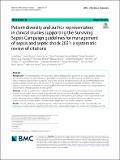Patient diversity and author representation in clinical studies supporting the Surviving Sepsis Campaign guidelines for management of sepsis and septic shock 2021: a systematic review of citations
Author(s)
Nazer, Lama; Abusara, Aseel; Aloran, Batoul; Szakmany, Tamas; Nabulsi, Hamza; Petushkov, Anton; Charpignon, Marie-Laure; Ahmed, Taghreed; Cobanaj, Marisa; Elaibaid, Mohammad; Lee, Christian; Li, Chenyu; Mlombwa, Donald; ... Show more Show less
Download12879_2023_Article_8745.pdf (956.6Kb)
Publisher with Creative Commons License
Publisher with Creative Commons License
Creative Commons Attribution
Terms of use
Metadata
Show full item recordAbstract
Abstract
Background
The generalizability of the Surviving Sepsis Campaign (SSC) guidelines to various patient populations and hospital settings has been debated. A quantitative assessment of the diversity and representation in the clinical evidence supporting the guidelines would help evaluate the generalizability of the recommendations and identify strategic research goals and priorities. In this study, we evaluated the diversity of patients in the original studies, in terms of sex, race/ethnicity, and geographical location. We also assessed diversity in sex and geographical representation among study first and last authors.
Methods
All clinical studies cited in support of the 2021 SSC adult guideline recommendations were identified. Original clinical studies were included, while editorials, reviews, non-clinical studies, and meta-analyses were excluded. For eligible studies, we recorded the proportion of male patients, percentage of each represented racial/ethnic subgroup (when available), and countries in which they were conducted. We also recorded the sex and location of the first and last authors. The World Bank classification was used to categorize countries.
Results
The SSC guidelines included six sections, with 85 recommendations based on 351 clinical studies. The proportion of male patients ranged from 47 to 62%. Most studies did not report the racial/ ethnic distribution of the included patients; when they did so, most were White patients (68–77%). Most studies were conducted in high-income countries (77–99%), which included Europe/Central Asia (33–66%) and North America (36–55%). Moreover, most first/last authors were males (55–93%) and from high-income countries (77–99%).
Conclusions
To enhance the generalizability of the SCC guidelines, stakeholders should define strategies to enhance the diversity and representation in clinical studies. Though there was reasonable representation in sex among patients included in clinical studies, the evidence did not reflect diversity in the race/ethnicity and geographical locations. There was also lack of diversity among the first and last authors contributing to the evidence.
Date issued
2023-11-01Department
Massachusetts Institute of Technology. Laboratory for Information and Decision Systems; Massachusetts Institute of Technology. Institute for Medical Engineering & Science; Harvard--MIT Program in Health Sciences and Technology. Laboratory for Computational PhysiologyPublisher
BioMed Central
Citation
BMC Infectious Diseases. 2023 Nov 01;23(1):751
Version: Final published version